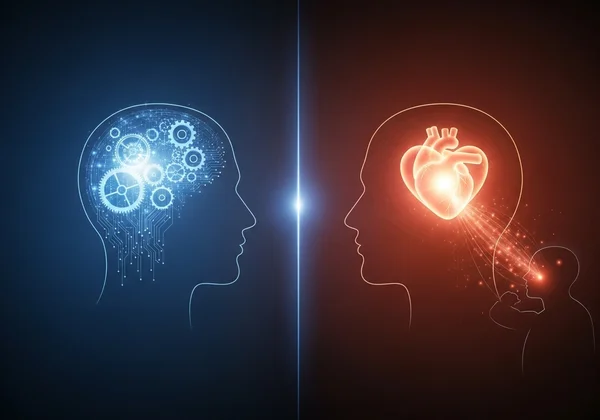Can a Sociopath Love? Insights from a Sociopath Test Perspective
August 17, 2025 | By Roman Caldwell
You feel the initial charm, the intense focus, the magnetic personality. But over time, something feels profoundly missing—a genuine, reciprocal emotional connection. When a relationship leaves you feeling more confused and drained than cherished, it’s natural to ask a deeply unsettling question: Can they truly love me? Exploring the complex answer to the question of whether a sociopath can love is the first step toward clarity. This guide explores the reality of love and attachment for individuals with traits of Antisocial Personality Disorder (ASPD), helping you understand the patterns you may be experiencing.
Navigating such a relationship can be isolating, but you are not alone in seeking answers. Gaining insight is a powerful act of self-care. For those questioning their own traits or the behaviors of a partner, a confidential tool for self-reflection can be a valuable starting point.
What Is ASPD and How Does It Affect Empathy?
To understand how love is perceived, we must first look at the psychological framework that shapes behavior. The term "sociopath" is commonly used to describe someone with Antisocial Personality Disorder (ASPD), a clinical diagnosis found in the Diagnostic and Statistical Manual of Mental Disorders (DSM-5). This condition is characterized by a pervasive pattern of disregard for and violation of the rights of others.
While many traits define ASPD, its impact on empathy is perhaps the most critical factor in relationships. This is where the capacity for love is fundamentally altered. It's not that individuals with these traits cannot understand love intellectually; it's that they often cannot feel it in the way most people do.
Defining Antisocial Personality Disorder (ASPD)
ASPD is not just about being "antisocial" in the sense of avoiding parties. It's a deeply ingrained pattern of behavior that includes impulsivity, deceitfulness, aggressiveness, and a consistent irresponsibility. A core diagnostic feature, according to the DSM-5, is a profound lack of remorse for one's actions. They may understand that hurting someone is socially unacceptable, but they don't feel the sting of guilt associated with that action. This emotional detachment is central to understanding their relational patterns.
The Crucial Difference: Cognitive vs. Affective Empathy
Empathy is not a single concept; it has two key components. Cognitive empathy is the ability to intellectually understand another person's emotional state. Someone with high cognitive empathy can accurately read social cues, predict reactions, and recognize what someone else is feeling. Many individuals with ASPD traits have excellent cognitive empathy, which makes them such effective manipulators and charmers.
Affective empathy, however, is the ability to feel or share in another person's emotional state. It’s the emotional echo you feel when a friend is heartbroken or joyful. This is the component that is severely deficient in those with sociopathic traits. They can see you are sad, but they don't feel your sadness with you. This emotional void makes a shared, bonded experience of love nearly impossible. If you’re questioning these behaviors, an antisocial personality disorder test can offer preliminary insights into these patterns.

Why a Lack of Remorse Changes Everything
In a healthy relationship, remorse is the glue that helps repair ruptures. When you hurt your partner, feeling guilty motivates you to apologize, make amends, and avoid repeating the behavior. For someone with a lack of remorse, this entire mechanism is absent. They might offer an apology, but it's often a calculated move to de-escalate a conflict or achieve a goal, not a reflection of genuine regret. This absence of guilt means there is little internal motivation to change harmful behaviors, leading to repeated cycles of hurt and deception.
How a Sociopath Behaves in Relationships
Recognizing the behavioral patterns is key to protecting your own well-being. Relationships with individuals exhibiting sociopathic traits often follow a predictable, three-act drama of idealization, devaluation, and discard. Understanding these stages can help you make sense of a chaotic and confusing experience.
The Initial Phase: Intense Charm and "Love Bombing"
The beginning of a relationship with a person showing ASPD traits can feel like a fairytale. They shower you with attention, praise, and what appears to be deep affection—a technique known as "love bombing." They mirror your interests, desires, and insecurities to create an illusion of a perfect soulmate connection. This intense idealization is not a sign of true love; it is a highly effective strategy to secure your trust and admiration, making you easier to control later on.

Patterns of Manipulation and Deceit
Once the connection is established, the dynamic often shifts. Patterns of manipulation and deceit become more common. This can include:
- Gaslighting: Making you doubt your own perceptions, memory, and sanity.
- Constant Lying: From small white lies to major fabrications, deceit is a tool used to maintain control and avoid accountability.
- Playing the Victim: Skillfully twisting situations to appear as the injured party, eliciting your sympathy and deflecting blame.
These behaviors are not accidental; they are purposeful tactics designed to keep you off-balance and emotionally dependent. How do you know if you are a sociopath or dealing with one? Recognizing these consistent patterns is the first step to gain more insight.
Superficial Connections and a Lack of Intimacy
Beneath the surface of intense interactions lies an emotional desert. The relationship is often characterized by superficial connections. While they may talk about a future together or use words of endearment, there is a distinct lack of true emotional intimacy. Vulnerability is seen as a weakness to be exploited, not a bridge to connection. The relationship revolves around their needs, and any "love" shown is conditional upon you fulfilling a specific purpose in their life.
The Reality of Loving Someone with Sociopathic Traits
The painful truth is that loving someone with sociopathic traits is often a one-sided experience. Your capacity for deep love and empathy is what makes you a target, and it's also what will be exhausted in the relationship. Acknowledging this reality is not a failure but an essential act of self-preservation.
Can They Form Attachments at All?
So, can they form attachments? Yes, but these attachments are typically transactional, not emotional. They may form a bond with someone who provides them with money, status, housing, or excitement. They become attached to what you do for them, not who you are. When you are no longer useful or a better option comes along, the attachment can be severed with a chilling lack of emotion.
Protecting Your Mental Health with Strong Boundaries
If you are in a relationship with someone exhibiting these traits, protecting your mental health is paramount. Establishing strong boundaries is not a suggestion; it is a necessity. This means clearly defining what you will and will not tolerate and enforcing those limits consistently, even if it leads to conflict. It may also mean creating emotional and physical distance to shield yourself from further manipulation and emotional harm.

Is It Love, or Is It a Transaction?
Ultimately, the affection shown by a person with ASPD is best understood as a transactional relationship. They are motivated by what they can gain. Their "love" is a strategy for personal benefit, and their "kindness" is a tool for control. True love, which is rooted in empathy, vulnerability, and mutual care, is a concept they can mimic but not genuinely experience. If these dynamics feel familiar, taking a free sociopath test can be a confidential first step to validate your feelings.
Gaining Clarity: Your Confidential Next Step
So, can a sociopath love? The answer is complex. They can mimic love, desire the benefits of a relationship, and form attachments based on utility. However, the deep, empathetic, and selfless connection that most people define as love is likely beyond their emotional capacity.
Understanding these patterns is the first step toward reclaiming your peace of mind. If this article resonates with you, it may be time to gain more clarity. Our free, DSM-5 based online sociopath test offers a confidential screening to help you understand troubling behaviors in a partner or reflect on your own traits. It is a tool for insight, not a diagnosis.
Disclaimer: This test is intended for educational and informational purposes only. It is not a substitute for professional medical advice, diagnosis, or treatment. Please consult a qualified mental health professional for any concerns about your mental health.
Frequently Asked Questions about ASPD and Relationships
What is the difference between a sociopath and a psychopath?
While often used interchangeably, there are some distinctions. "Sociopathy" (ASPD) is thought to be linked more to environmental factors, with individuals tending to be more impulsive and erratic. "Psychopathy" is considered more a result of genetics, characterized by a complete lack of empathy and more calculated, organized behavior. Both fall under the umbrella of ASPD in the DSM-5 and share core traits like a lack of remorse.
How do sociopaths act in romantic relationships?
In romantic relationships, they typically follow a pattern: intense love bombing at the start to secure a partner, followed by manipulation, deceit, and emotional detachment. The relationship often feels like a rollercoaster of highs and lows, leaving the partner feeling confused, anxious, and emotionally drained. The goal is control and self-gratification, not mutual connection. Recognizing these signs is crucial, and a preliminary screening can help you organize your thoughts.
Can a person with sociopathy change for someone they love?
Change for individuals with deeply ingrained ASPD traits is incredibly difficult and rare. Because their actions are not driven by genuine emotional connection or remorse, the motivation to change for a loved one is usually absent. Meaningful change, if it occurs at all, typically requires years of intensive, specialized therapy aimed at managing behavior rather than developing empathy. Relying on your love to "cure" them is an unrealistic and often damaging expectation.